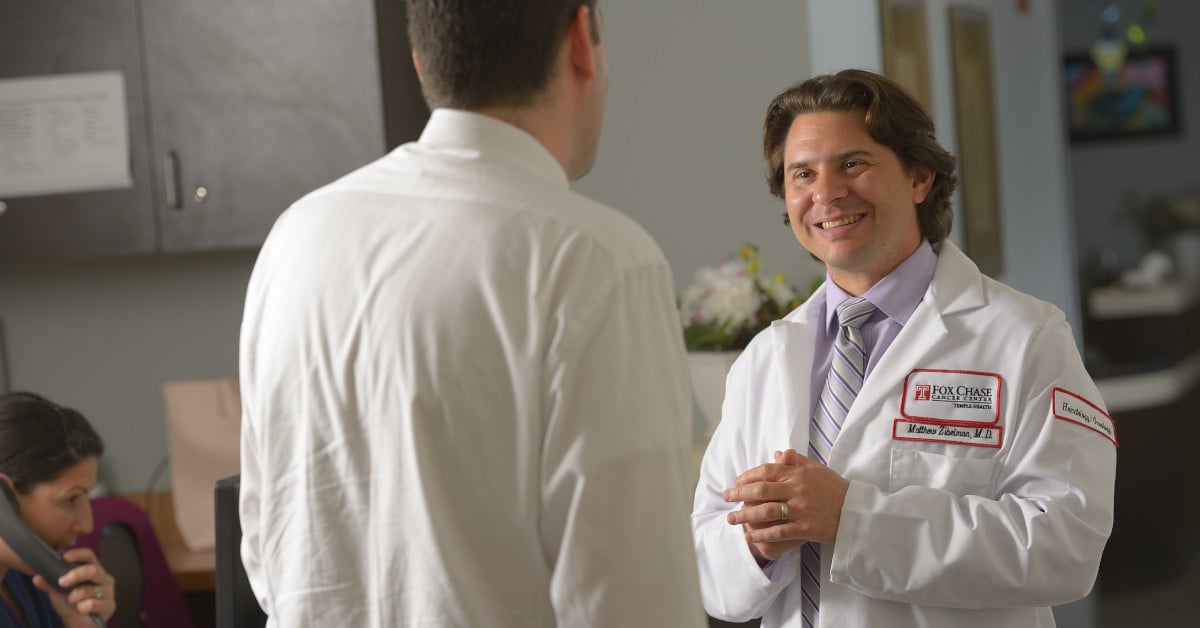Weather Alert: Following the winter storm, all Temple Health hospitals, campuses and clinical locations remain open. Patients will be contacted directly if their visit is affected. Please check TempleHealth.org or FoxChase.org for updates and monitor myTempleHealth for changes to scheduled appointments.
Breadcrumb
- Home
- Thrive Cancer Blog
- Common Questions About Cancer Clinical Trials

Common Questions About Cancer Clinical Trials
-
Clinical trials are crucial for the advancement of medical treatments for many diseases, including cancer. Many cancer treatments used today are the result of clinical trials, and those currently taking place may help us develop better ways to treat cancer in the future.
To help you better understand cancer clinical trials, we asked Matthew R. Zibelman, MD, a medical oncologist at Fox Chase Cancer Center, to answer some common questions about them:
Q: What are clinical trials?
A: Clinical trials study medical treatments to see if they are effective at treating specific diseases. These trials provide patients access to newer drugs, therapies and combinations that have the potential to help them live longer, feel better, and/or experience fewer side effects.
“Clinical trials can improve patient care and lead the way to better treatment options in the future.” Zibelman said.
Q: What are the benefits of clinical trials?
A: Any new treatment comes with risks and unknowns (including the potential for side effects), but there are also many benefits of clinical trials. As a patient enrolled in a clinical trial, you may have access to a treatment that’s not available otherwise, and you might help other people by furthering cancer research.
Also, patients enrolled in clinical trials have access to a research team that will support them through their study. This team serves as a contact for patients to report any side effects to, coordinates schedules and trial-related appointments, and answers any questions or concerns that come up before, during and after the trial.
If you are considering clinical trial enrollment, it is best to discuss the risks and benefits of specific trials with your oncology care team. Your oncologist and other members of your care team are dedicated to offering you the best treatment options for your specific situation and will be happy to weigh the pros and cons with you.
Q: How can I find out if I am eligible for a clinical trial?
A: If you are interested in participating in a clinical trial, it is best to talk to your oncologist at your next appointment.
“When you’re at a decision point about needing a new treatment or some sort of intervention, your care team will be able to discuss available trials and your eligibility,” Zibelman said.
At National Cancer Institute (NCI)-designated Comprehensive Cancer Centers, like Fox Chase, researchers and clinicians develop trials that are offered at their facilities. In addition, they partner with other cancer centers and pharmaceutical companies to offer other groundbreaking trials. This gives patients access to clinical trials that may not be available through other healthcare institutions.
Q: What should I ask before enrolling in a clinical trial?
A: When considering a clinical trial, you should ask your care team about the following:
- Potential side effect of the trial's treatment
- Any patient financial obligations and if they are covered by your insurance
- What the time commitment of the trial is and when you will need to come in for treatment and tests
Q: If I sign up for a clinical trial, do I have stay in it?
A: No. Clinical trials aren’t always a perfect fit, and participation is always the patient’s choice.
“Patients can drop out of a clinical trial at any point for any reason or no reason at all,” Zibelman said. “For example, if a drug isn’t working, the side effects of the treatment get to be too intense, or the time required is too much, a patient can always stop participating in the trial.”
Clinical trials are an important facet of cancer treatment, and it’s always a good idea for patients to discuss their options with their care team before deciding on a course of treatment. Having clinical trials as an option may provide patients with additional therapies to consider that may improve their quality and/or quantity of life.
Learn more about the clinical trials open at Fox Chase Cancer Center.
